HIT CHANNEL EXCLUSIVE INTERVIEW: December 2021. We had the great honour to talk with a legendary musician: Don Airey. He is best known as the keyboard player of Deep Purple since 2002. He has also worked with Rainbow, Gary Moore, Ozzy Osbourne, Black Sabbath and Judas Priest. Deep Purple just released “Turning to Crime”, a covers album. In 2020, “Whoosh!” came out, a studio album of new material. Read below the very interesting things he told us:
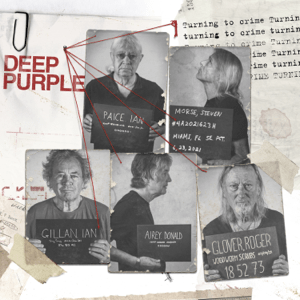 How did you come up with the idea to make a covers album, “Turning to Crime”?
How did you come up with the idea to make a covers album, “Turning to Crime”?
Well, it started during lockdown. We had to cancel our gigs, we had to cancel our recording time. So, then we had a phone conference and I think it was Bob Ezrin , our producer, who suggested: “Why don’t we just do a covers album and do it remotely?” You know, we write when we are getting together in the same room, but we couldn’t do that, so it seemed an obvious idea and that’s all we did. So, I arranged four tracks, Steve Morse (guitar) arranged four and Roger Glover (bass) arranged four and we just started sending them on and people had to add bits to them. It’s quite a long-winded process but it seems to work very well.
How much did the coronavirus restrictions affect the making of “Turning to Crime”?
I mean, they had a pretty enormous effect because we couldn’t get together, so we were all separate. Because it was lockdown, I mean in my case, I ‘ve got a home studio, but I always have an engineer that comes and works for me. So, I had to do my own engineering. That was quite a challenge for me because it was something that I haven’t done before. It took a bit to get used to. Working on your own it was quite different to working in a room full of people who could give advice and comments on what you are doing.
Did you miss the interaction with the other members in the studio while recording “Turning to Crime” remotely?
Yes, that’s right. That’s what you really miss. You really miss the interaction. There is a certain pressure that produces results that you don’t quite get when you are on your own. But Ian Paice (drums) said that he really enjoyed it because for the first time he wasn’t given paper writing. There was no impatience, he could take as long as he liked to get what he wanted to do right. So, he really enjoyed the process and it shows. I think when the drum tracks started coming round, that’s when the whole idea took off and we really get to work.
Did you have fun playing old school piano in “Rockin’ Pneumonia and the Boogie Woogie Flu” (Huey “Piano” Smith)?
(Laughs) I mean, quite a few people have said to me: “Oh, I didn’t know that you played the piano” but I do play the piano. It’s nice to play that stuff. I learned it from my father, actually. He used to be a boogie woogie pianist, just amateur. But he was very good in it. He showed me Fats Waller, Pete Johnson, Meade Lux Lewis, all those people. So, it was great fun for me to do something like that.
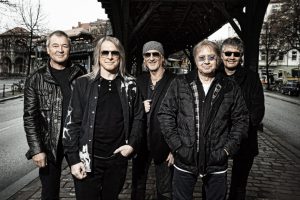 Your playing in “Let the Good Times Roll” (Ray Charles & Quincy Jones/ written by Louis Jordan) is fantastic! Would you like to tell us a few words about this song?
Your playing in “Let the Good Times Roll” (Ray Charles & Quincy Jones/ written by Louis Jordan) is fantastic! Would you like to tell us a few words about this song?
Oh, thank you! It’s a song actually that I know very well, because every two years or so, I run a charity festival in my own village (ed: Great Gransden). It is just called “Blues & Soul Festival”. We have a five-piece brass section and we play a lot of old blues, you know, that kind of thing. So, that’s one the things we do and Paicey (ed: Ian Paice) sometimes comes up and he plays and he’s a big fan of that number. And every time he played it in the festival it went down a storm. So, it was an obvious one to include. I think Paicey did an amazing job on it. He sounds like Art Blakey and Roger Glover sounds like Ray Brown from Oscar Peterson. They really did a wonderful job playing swing. It wasn’t quite easy for rockers to do. I think basic arrangement is Quincy Jones’ but I transcribed it and sent on the parts. I mean, I’m fond of the organ solo and the piano solo. Good song.
“Caught in the Act” medley is one of the highlights of the album. It sounds very natural. Are you proud of this?
That’s one of mine, too. I arranged that one. When we come out and do an encore live usually the first encore is “Hush” but we always play something before it, to go into it. Sometimes is Booker T. or sometimes we would play “Gimme Some Lovin’” (The Spencer Davis Group) or “Dazed and Confused” (Led Zeppelin, written by Jake Holmes), you know, this short burst. So, I stuck all these songs that really occupy that spot into one number. That was a great fun to do. I am very pleased with the “Hot ‘Lanta”, the Allman Brothers one. We really sound like The Allman Brothers (laughs).
Do you feel comfortable playing in a Deep Purple release songs from different kinds of music such as “Dixie Chicken” (Little Feat) and “The Battle of New Orleans” (Lonnie Donegan/ Johnny Horton/ written by Jimmy Driftwood) ?
The last one is a usual choice because that is something that we actually used to do on stage in the middle of speaking. Roger Glover and Ian Gillan (vocals) were in a band called Episode Six and they used to do “The Battle of New Orleans” in Episode Six. So, it used to pop up in Deep Purple gigs at one point. It’s a very famous number in Britain. It was one of the homegrown rock ‘n’ roll songs that was a hit in England by a man called Lonnie Donegan and that means a lot to us in our upbringing. It was a very important record because there has never been anything like it coming out of England before.
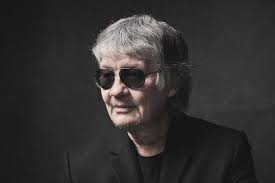 Do you think “Turning to Crime” is also a good opportunity for younger listeners to learn about the music of Fleetwood Mac, Yardbirds, Lonnie Donegan and others?
Do you think “Turning to Crime” is also a good opportunity for younger listeners to learn about the music of Fleetwood Mac, Yardbirds, Lonnie Donegan and others?
Yeah. I think, one thing that I am very fond of is that we didn’t go to do anything too obvious: No Beatles songs, no Rolling Stones, no Who. Just numbers that meant a lot to us, personally. For me, “Oh Well” (Fleetwood Mac) just means so much, because I used to play with Gary Moore when we were in Colosseum II and Peter Green had taught him to play it. So, it’s a number that’s very close to my heart. So, I think it ‘s good that the people might be introduced to it, young people might be introduced to music that perhaps they didn’t know very well.
Did you suggest any of the songs of “Turning to Crime” album?
Yeah, I have suggested four which are “Jenny Take A Ride!” (Mitch Ryder & the Detroit Wheels), “Let the Good Times Roll”, “Rockin’ Pneumonia and the Boogie Woogie Flu” and the medley.
I am a big fan of “Nothing at All” from the “Whoosh!” (2020) album. Please tell us everything we should know about this nice song?
(Laughs) Yes, it’s a wonderful song and there is an unusual feel to it for a rock band, like an old-fashioned roll or something. There was research that I had to do for the keyboard solo and suddenly the Bach “Partita” just emerged. So, we put that in the organ solo. The difficulty with that was that the Bach piece is originally in E but we played E and D, so I had to transcribe and learn it in a different key, but it really works. Everything goes “Oh, what’s that tune?” It’s a wonderful thing, but I didn’t write it, J.S. Bach wrote it.
Deep Purple still remain an amazing band on stage. What is the secret?
The secret is to keep doing it as much as you can, then you get better every gig. That’s really Deep Purple’s mainstay: live, doing tours. For 10 years we were doing 150 to 190 gigs a year. It’s a lot of work. That’s really what music is: It is when you are playing live for people. That’s the essence of the musical zeitgeist, if you like, in our communication between the musicians and this audience. It’s the most important thing.
Are you looking forward to going on the road next year?
I think we can’t wait. We are just keeping our fingers crossed, hoping it all comes off. It certainly is very helpful that we are going to be able to tour again properly.
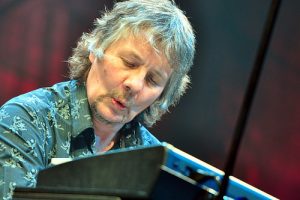 Was it a big challenge for you to replace Jon Lord in Deep Purple in 2002?
Was it a big challenge for you to replace Jon Lord in Deep Purple in 2002?
It was easy at first. It’s just a little harder as the years have gone on (laughs), if you see what I mean. You know, there was more to Jon than just playing the Hammond organ, he was the bandleader. He set the tone. I’m kind of a different person to Jon. So, we had to make adjustments. It first, it was easy. It was such a joy for me, to play that music, but the ramifications of taking over from Jon gradually dawn on you, as the years go by. So, it hasn’t been easy. It’s not an easy gig for a keyboard player.
Was it an interesting experience to play at Live 8 in Barrie, Ontario in 2005?
Yes, it was a great day. Gordon Lightfoot was on; Motley Crue, old friends; Bachman-Turner Overdrive were on and they were just amazing. So, it was a great day for us. We jetted in and after we finish there we flew and we did another gig, in Detroit, I think. So, it was busy all day.
You were a member of Rainbow. It is a bit surreal that you are now in Deep Purple and Ritchie Blackmore is not?
(Laughs) It’s funny. I met up with Ritchie. I went to see him. He was playing a gig with his band. It was quite a few years ago and I went backstage to see him. It was very nice to see him, I must say. Ritchie was never asking questions and I said to him: “Ritchie, I feel really strange”. He said: “Why?” I said: “We were talking about Deep Purple and I ‘m in it and you are not” and Ritchie said: “Yes, band politics is a very strange thing” (laughs).
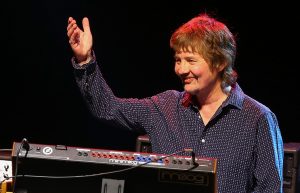 How did it happen to record the bass parts on a Minimoog in Judas Priest’s “Painkiller” (1990) album?
How did it happen to record the bass parts on a Minimoog in Judas Priest’s “Painkiller” (1990) album?
It was so long ago, I don’t really remember. I know Ian Hill (bass) wasn’t well. He was in hospital. I just had to play, so they could finish the guitars off. I just put a few bass lines on. It’s not the whole album. It’s two or three tracks. I think Ian was so ill, he never came back to complete it.
You did many albums with Gary Moore. What was so special about him?
He’s the best guitar player ever lived, in my opinion.
Do you think popular music that was written in the ‘60s and ‘70s is much better than today’s music?
It’s a different time, isn’t it? You can’t compare the music of then with the music of today, because everything has changed; society is different. The technology is completely different, people are very soft-scented now. So, music is very soft scented now, you know. Music is made in a room by one person for one person in a room. In our days, music was made by a lot of people in a room for a lot of people in the room. They are different circumstances.
Do you have any musical ambitions left?
The ambition is to try and get better, try to be a better musician. That’s what you do every day. Otherwise, you just drift away. That’s why you keep practicing, you keep writing, you keep in touch with all your friends. I’m just hopeful of a better day.
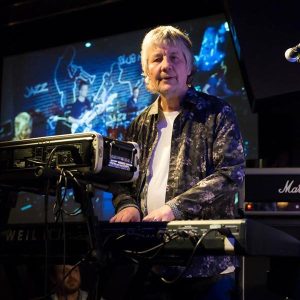 Who are your influences as a keyboard player?
Who are your influences as a keyboard player?
A lot of classical players. People like Ashkenazy, Alfred Brendel. Of the modern players: Yuja Wang. They have been a big influence on me. I love the jazz players: Chick Corea in particular, Jan Hammer. On the organ, Jimmy Smith of course and Billy Preston. You know, I’m a big fan of songwriters like McCartney. I have particularly become of fan of Billie Eilish’s songwriting. I think she’s a real genius and it’s very refreshing to have someone a baritone (ed: ukulele) around in the music business again. That’s what inspires me, yeah.
Over the years you have become a huge Clapton fan. Do you feel a bit jealous of Chris Stainton, his regular keyboard player?
I mean, I don’t know him. He’s a great player. I saw him once with Eric at the Albert Hall. He was just fantastic. I don’t know what he is doing now. Maybe, he’s not around anymore, I’m not quite sure.
A huge “THANK YOU” to Mr. Don Airey for his time. I should also thank Leonhard Janssen for his valuable help.
Deep Purple official websites: https://deep-purple.com https://deeppurple.com
Deep Purple official Facebook page: https://www.facebook.com/officialdeeppurple

